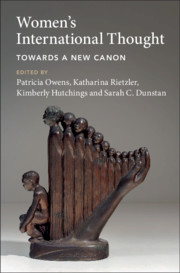Book contents
- Women’s International Thought: Towards a New Canon
- Women’s International Thought: Towards a New Canon
- Copyright page
- Contents
- Preface and Acknowledgments
- Introduction
- 1 Field and Discipline
- 2 Geopolitics and War
- 3 Imperialism
- 4 Anticolonialism
- 5 International Law and International Organization
- 6 Diplomacy and Foreign Policy
- 7 World Peace
- 8 World Economy
- 9 Men, Women, and Gender
- 10 Public Opinion and Education
- 11 Population, Nation, Immigration
- From “The Right of Nations to Self-Determination” (1907)
- From Pivot of Civilization (1922)
- From Modern Immigration (1925)
- From Neuroses of the Nations (1925)
- From The Protection of Minorities (1928)
- From “Caravans of Sorrow: Noncitizen Americans of the Southwest” (1940)
- From “Conditional Philanthropy towards Colored Students in Britain” (1960)
- From “Minority Peoples in China” (1961)
- Rosa Luxemburg
- Margaret Sanger
- Annie Marion Maclean
- Caroline Playne
- Lucy Philip Mair
- Luisa Moreno
- Sheila Kitzinger
- Shirley Graham
- 12 Technology, Progress, and Environment
- 13 Religion and Ethics
- Index
Rosa Luxemburg
from 11 - Population, Nation, Immigration
Published online by Cambridge University Press: 12 April 2022
- Women’s International Thought: Towards a New Canon
- Women’s International Thought: Towards a New Canon
- Copyright page
- Contents
- Preface and Acknowledgments
- Introduction
- 1 Field and Discipline
- 2 Geopolitics and War
- 3 Imperialism
- 4 Anticolonialism
- 5 International Law and International Organization
- 6 Diplomacy and Foreign Policy
- 7 World Peace
- 8 World Economy
- 9 Men, Women, and Gender
- 10 Public Opinion and Education
- 11 Population, Nation, Immigration
- From “The Right of Nations to Self-Determination” (1907)
- From Pivot of Civilization (1922)
- From Modern Immigration (1925)
- From Neuroses of the Nations (1925)
- From The Protection of Minorities (1928)
- From “Caravans of Sorrow: Noncitizen Americans of the Southwest” (1940)
- From “Conditional Philanthropy towards Colored Students in Britain” (1960)
- From “Minority Peoples in China” (1961)
- Rosa Luxemburg
- Margaret Sanger
- Annie Marion Maclean
- Caroline Playne
- Lucy Philip Mair
- Luisa Moreno
- Sheila Kitzinger
- Shirley Graham
- 12 Technology, Progress, and Environment
- 13 Religion and Ethics
- Index
Summary
Among other problems, the 1905 Revolution in Russia has brought into focus the nationality question. Until now, this problem has been urgent only in Austria-Hungary. At present, however, it has become crucial also in Russia, because the revolutionary development made all classes and all political parties acutely aware of the need to solve the nationality question as a matter of practical politics. All the newly formed or forming parties in Russia, be they radical, liberal or reactionary, have been forced to include in their programs some sort of a position on the nationality question, which is closely connected with the entire complex of the state’s internal and external policies. For a workers’ party, nationality is a question both of program and of class organization. The position a workers’ party assumes on the nationality question, as on every other question, must differ in method and basic approach from the positions of even the most radical bourgeois parties, and from the positions of the Pseudo-socialistic [sic], petit bourgeois parties. Social Democracy, whose political program is based on the scientific method of historical materialism and the class struggle, cannot make an exception with respect to the nationality question. Moreover, it is only by approaching the problem from the standpoint of scientific socialism that the politics of Social Democracy will offer a solution which is essentially uniform, even though the program must take into account the wide variety of forms of the nationality question arising from the social, historical, and ethnic diversity of the Russian empire.
- Type
- Chapter
- Information
- Women's International Thought: Towards a New Canon , pp. 587 - 592Publisher: Cambridge University PressPrint publication year: 2022

